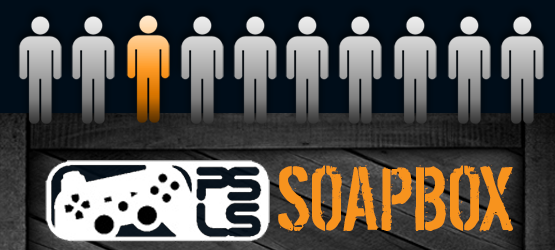The Soapbox is a PlayStation LifeStyle feature in which the community can have their voices heard. Last month we asked for your entries and received a lot of great pieces from you, enough that we decided to honor a runner up as well as selecting a winner. The decision was a tough one, but together, the PSLS staff has chosen the winners for this month’s Soapbox.
Congratulations to Giovanni Quondam (aka Hybrid Extreme on the forums) for taking the runner up spot! Giovanni’s piece brings up questions about games that are being developed for multiple consoles, and the fear that this might hold them back given certain hardware limitations.
Keep an eye out in the coming days for our Soapbox winner and instructions for next month’s Soapbox entry.
Note that all opinions below are those of the author and do not necessarily reflect the views of PlayStation LifeStyle or its staff.
Console Parity
by Giovanni Quondam
What is console parity? It is purposely under-utilizing the available technology and power in a superior console so that a game looks and plays the same on inferior competing consoles.
It’s the latest trend in game development, or at least the latest that’s been made public! Developers are creating dumbed down versions of games to maintain a balance between consoles. A balance, by the way, that has never been publicly requested by gamers or console makers. It has happened with Watch Dogs and it is happening with The Witcher 3, The Division and likely others too.
I wrote a post [on the forums] a while back called ‘DualShock 4 or DualShock Forgotten’ in which I discuss how the DualShock 4 controller is not being used to its full potential by third party developers and is being minimized with regard to controller abilities for the sake of maintaining a balance with competitor, Xbox One. It seems that this practice is being carried on with the entire development of games that are made for multiple platforms.
While the decision to forego power for parity is the choice of the developer, it really is an insult to gamers who invested in the superior console — specifically the PlayStation 4 — but certainly to PC gamers as well. Those individuals bought the PS4 believing that developers would optimize games made for it. Third party developers brag about how powerful the PS4 is and how easy it is to develop for, yet the common practice seems to be to use the limited power and technical capabilities of the competing console, namely the Xbox One, as the standard in which next gen games are made. Is this a case of developers wanting to be impartial to console makers? Are they being “encouraged” with financial incentives to dumb down PS4 and PC versions of games? Or are they simply taking the lazy route by developing uniformly between consoles?
Sometimes I wonder if developers do it to optimize sales potential on multiple consoles, which is still wrong in my opinion. The argument could be made by developers that they create games using console parity as a way not to show favoritism to any particular console maker. If this is the case then I would suggest that using console parity by not optimizing the power of the PS4 is actually showing favoritism to the Xbox One! The point is, you can’t ignore the available tech and power of the PS4 because it might hurt Microsoft’s feelings! Microsoft knew exactly which components were going into their console when they designed it and they have to live with their console’s limitations or build a more powerful Xbox One.
There is another argument to consider. Imagine a room with 100 people in it that fit into four groups: PS4/PC/Wii U/Xbox One gamers. There is no distinction of how many people own any given system, only that they all own at least one system. Which group would you make a game for? Would you go by national/global sales figures to see who the industry leader was? These 100 people may or may not represent those figures accurately! Would console parity be the correct answer so that no matter which system you make a game for everyone gets the same quality of game?
The only correct answer is to develop a game that fits each system, optimizing their power and technical capabilities. If console parity isn’t possible using those factors, oh well! People aren’t stupid. They know the capabilities and limitations of their gaming system of choice and proof of purchase is also proof of their willingness to accept what their system can and cannot do! I know my WiiU can’t do what my PS4 or gaming PC can, but I don’t expect developers to dumb down a game so that the WiiU and Ps4/PC versions look and play the same.
Should Sony be investigating this? Should they be concerned? I mean, why create a powerful system if third party developers are going to use the less powerful console as the tech model in which games are created? This is one reason I am so glad that Sony’s first party studios are hard at work making games. It’s also a good reason to start liking the term “Sony exclusive” more and more!
I own a PS4 and while I’m confident that first party developers are optimizing games as best as they can for the console I now know that third party developers aren’t. In my opinion, console parity is the next wrong step in a long line of wrong steps in the video game industry. Why should PS4 owners have to play a dumbed down version of a game just because the Xbox One can’t compete on a technical level? If developers can make different versions of the same game for old and new gen consoles then it’s possible for them to make a lower spec version of a game for Xbox One, a higher spec version for PS4, and an even higher spec version for those running powerful gaming PCs.
Console parity is bad for the industry… or at least that’s my opinion. What’s yours?








